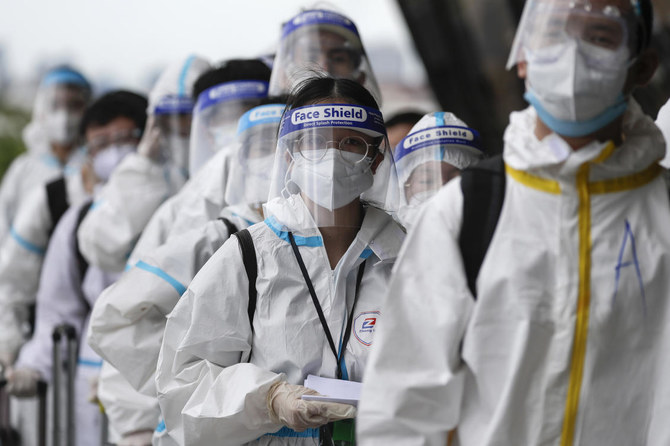MANILA: Coronavirus infections in the Philippines have surged past 500,000 in a new milestone with the government facing criticism for failing to immediately launch a vaccination program amid a global scramble for COVID-19 vaccines.
The Department of Health reported 1,895 new infections Sunday, bringing confirmed coronavirus cases in the country to 500,577, the second highest in Southeast Asia. There have been at least 9,895 deaths.
The Philippines has been negotiating with seven Western and Chinese companies to secure 148 million doses of COVID-19 vaccine but the effort has been fraught with uncertainties and confusion. About 50,000 doses from China-based Sinovac Biotech Ltd. may arrive later next month followed by much larger shipments, according to the government, but concerns have been raised over its efficacy.
President Rodrigo Duterte says securing the vaccines has been difficult because wealthy nations have secured massive doses for their citizens first.
Duterte’s elite guards have acknowledged they have been inoculated with a still-unauthorized COVID-19 vaccine partly to ensure that they would not infect the 75-year-old president. The disclosure set off a flurry of criticism, including from senators, who moved to investigate the illegal vaccinations of the presidential guards, but Duterte ordered his guards not to appear before the Senate.
Philippine coronavirus cases hit 500,000 amid vaccine struggles
https://arab.news/rwswn
Philippine coronavirus cases hit 500,000 amid vaccine struggles

- Latest coronavirus figures the second highest in Southeast Asia
- The Philippines has been negotiating to secure 148 million doses of COVID-19 vaccine
France’s Macron laughs off ‘harmless’ eye condition as he addresses troops

French President Emmanuel Macron joked about a “completely harmless” eye condition on Thursday during a New Year address to France’s armed forces.
“Please pardon the unsightly appearance of my eye,” Macron said at the beginning of his speech. “It is, of course, something completely harmless.”
Macron appeared with a puffy, red eye during his speech at the military base in Istres, in southern France. He earlier wore sunglasses during an outdoor troop inspection.
“Simply see an unintentional reference to the ‘Eye of the Tiger’ ... For those who catch the reference, it is a sign of determination,” he joked, in an apparent reference to the name of the hit theme song by American rock band Survivor from the 1982 Rocky III movie starring Sylvester Stallone.
Macron’s speech addressed key challenges for the military in 2026, from France’s accelerated rearmament and continued support for Ukraine, to the decision to send troops to Greenland in a show of support for Denmark.














